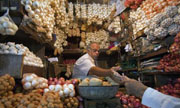VOA慢速英语2011--High Food Prices, Revolutions, and the Future(在线收听)
Agriculture Report - High Food Prices, Revolutions, and the Future
农业报道 - 高粮价的影响及未来
This is the VOA Special English Agriculture Report.
这里是美国之音慢速英语农业报道。
Food prices are down from their record highs in February. But prices are still higher than they were a year ago. In a year of Arab protests, high food prices helped fuel the anger against oppression, corruption and poverty.
粮食价格已从2月份的最高点有所回落,但仍高于一年前的价格。
Many experts think the political fires that burned across North Africa and the Middle East started last year in the wheat fields of Russia. A combination of heat, drought and wildfires during the summer of twenty-ten destroyed one-third of Russia's winter wheat crop. World food prices rose after Russia halted wheat exports.
许多专家认为,燃遍北非和中东的政治大火源于去年俄罗斯的麦田。2010年夏季的高温、干旱和野火凑到一块,摧毁了俄罗斯冬小麦作物1/3的产量。俄罗斯暂停小麦出口后,全球粮食价格上涨。
Shenggen Fan is head of the International Food Policy Research Institute in Washington. He links higher food prices to the uprisings in Egypt and other Arab countries.
樊胜根(Shenggen Fan,音译)是华盛顿国际粮食政策研究所负责人。
SHENGGEN FAN: "Definitely, it is one of the factors that really caused the Arab Spring."
The last time food prices jumped was in two thousand eight. At that time, Egypt was also was among the countries where food riots and demonstrations took place.
上次粮食价格上涨是在2008年。当时,埃及就位居这些发生粮食骚乱和示威的国家之列。
 |
| A vendor exchanges money with a customer at a shop selling garlic, onions and potatoes at a wholesale market in Mumbai. India's food price index rose 8.76 percent in the year to April 16, government data showed. |
Ghiyath Nakshbendi is a professor in the Department of International Business at American University in Washington. He agrees that food prices played a part in the Arab revolutions.
Ghiyath Nakshbendi是华盛顿美国大学国际商务系的一名教授。他也同意说粮食价格在阿拉伯革命中发挥了一定作用。
GHIYATH NAKSHBENDI: "At the end of the day, the most crucial reason for the Arab Spring is basically economic. And so consequently when a citizen cannot have enough money to purchase food and feed his family, definitely that will create a kind of upset with the system."
GHIYATH NAKSHBENDI:“最终,阿拉伯之春的关键原因主要是由于经济。因此当一位市民没有足够的钱购买食物养活他的家人,这肯定会引发对这一社会体系的不满。”
Professor Nakshbendi says an event like climate change can affect food production in many countries. But in a globally connected economy, even an event in one country can be felt worldwide.
Nakshbendi教授说,气候变化一类的事件会影响到许多国家的粮食生产。但在全球紧密联系的经济中,即使是发生在一个国家的事件也会影响到全球。”
GHIYATH NAKSHBENDI: "Something happening in Thailand is going to have an impact on rice export to other countries."
GHIYATH NAKSHBENDI:“泰国发生的一些事情就会影响到泰国出口大米到其它国家。”
Cornell University economist Chris Barrett says another problem is that gains in farm production have slowed.
美国康奈尔大学经济学家克里斯·巴雷特(Chris Barrett)说,另一个问题是农产品的增长放缓。
CHRIS BARRETT: "What we are seeing right now is the bitter harvest of very poor investments in agriculture research over really the last twenty years."
巴雷特:“当前我们看到的就是最近20年来缺乏农业科研投资的苦果。”
Shenngun Fan says the return of high prices in twenty-eleven offers some important lessons. If investment in food production does not increase, he says, then the world will continue to see high prices.
樊胜根说,2011年高粮价的回归提供了一些重要的教训。他说,如果粮食生产投资不增加,那么全球将继续维持高价格。
SHENGGEN FAN: "Food price hikes will come more often and more frequent. Second, food prices obviously will remain very high."
樊胜根:“食品价格上涨会来得更加频繁。其次,粮食价格显然还将维持高位。”
He says food supplies are not growing enough to meet the demand of seven billion people. The world is expected to add two billion more by the middle of the century. And people in emerging economies like China are eating more meat, which requires more animal feed. But in twenty-eleven, for the first time, the United States used more maize, or corn, for biofuels than for animal feed.
他说,粮食供应增长不足以满足70亿人口的需求。预计到本世纪中叶全球人口会新增20亿以上。而像中国这样的新兴经济体消费了更多肉类,这就需要喂养更多牲畜。但2011年美国在制造生物燃料上耗费的玉米首次超过了喂养牲畜。
The good news is that high prices always encourage farmers to grow more. A record harvest in twenty-eleven is helping to ease food prices in many parts of the world, but not all.
好消息是高价格会促使农民种植更多粮食。2011年创纪录的丰收有助于缓解全球许多地区的粮食价格,但不是全部国家。
And that's the VOA Special English Agriculture Report. I'm Karen Leggett.
___
Contributing: Steve Baragona and Jerilyn Watson